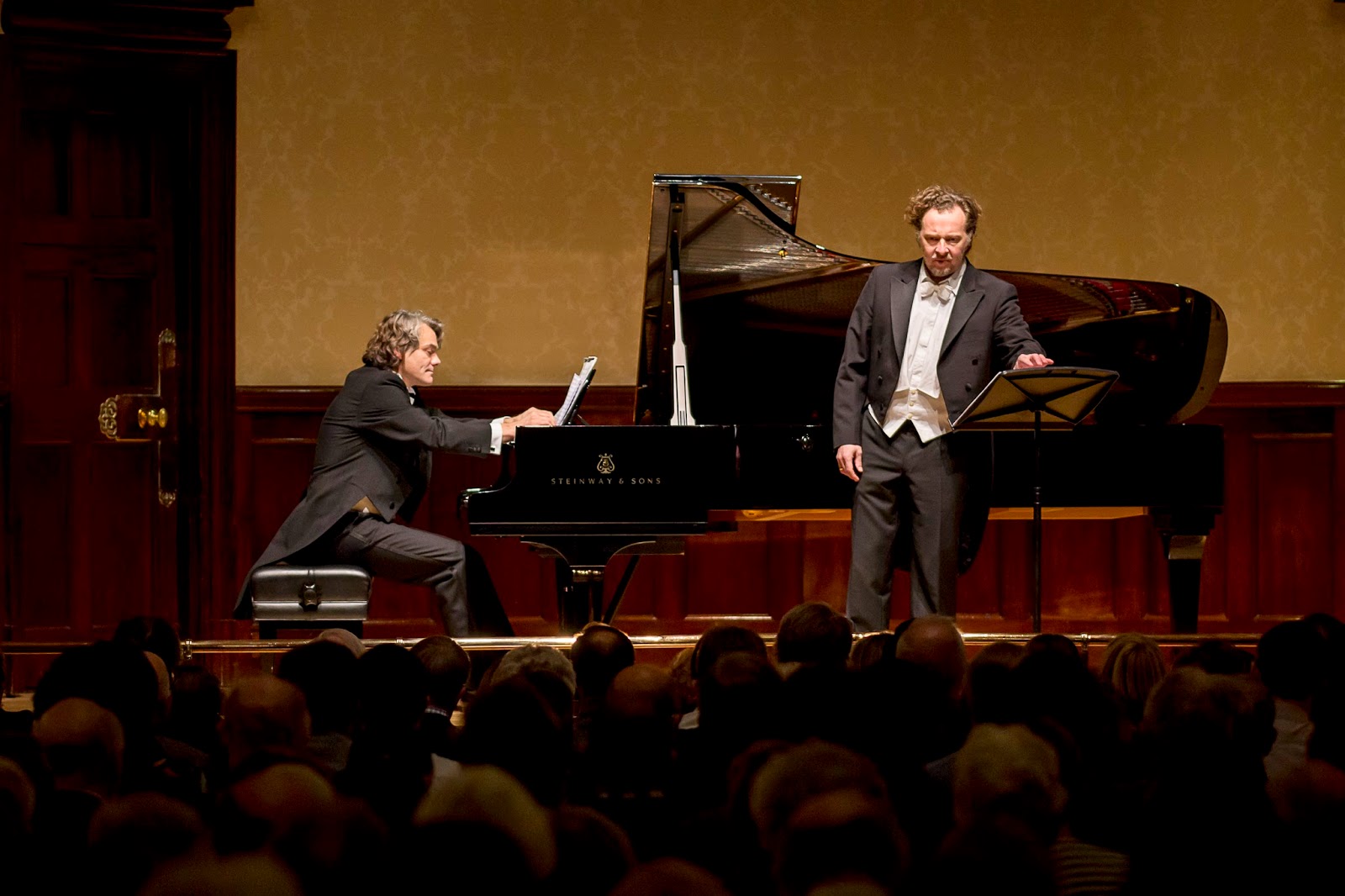Wigmore Hall
Lieder
eines fahrenden Gesellen
Songs from Des Knaben Wunderhorn
Kindertotenlieder
It has always proved a great
pleasure for me to hear Christian Gerhaher, and this Wigmore Hall recital
proved no exception. I worried a little during the opening Lieder eines fahrenden Gesellen that it might, indeed worrying
more than slightly during the first song, ‘Wenn mein Schatz Hochzeit macht’.
One should of course bear in mind that there is rarely, if ever, one correct
tempo for a piece. As Wagner observed in his brilliant little book, Über das Dirigieren, quoted approvingly
more than once by that great Mahlerian, Pierre Boulez, the relationships
between different tempi are really the crucial matter. (Even that, I think, is
not a hard-and-fast rule, but it seems far closer to the truth.) That said, it
is not the case that just anything goes, and the weirdly distended tempo for
this song adopted by Gerhaher and his pianist, Gerold Huber, simply did not
work for these ears. Yes, it will be a ‘day of mourning’ (‘Hab ich meinen
traurigen Tag!’) when the wayfarer’s beloved has her wedding day, but the music
did not seem able to support such a reading, still less quite so abrupt a shift
in the second stanza. Given that the voice I most often hear in my head when
thinking of these songs is that of Dietrich Fischer-Dieskau – and what a wonderful
performer of them he was! – I was surprised also to hear Gerhaher occasionally
depart from the general beauty of his musical line to sound a little close to a
caricature of Fischer-Dieskau at his most hectoring. But there was much to admire
here, not just in Gerhaher’s tone, but in its alchemy with Mahler’s own words.
Huber generally provided good support, often more than that in formal terms,
structures emerging clearly and strongly. There were perhaps, though, a few
occasions on which he might have proved more flexible; if a good conductor can,
then a pianist should certainly be able to do so.
Ten songs from Des Knaben Wunderhorn ( ‘Wer hat dies
Liedlein erdacht?’, ‘Ablösung im Sommer’, ‘Ich ging mit Lust’, ‘Um schlimme
Kinder artig zu machen’, ‘Rheinlegendchen’, ‘Der Schildwache Nachtlied’, ‘Lied
des Verfolgten im Turm’, ‘Das irdische Leben’, ‘Zu Straßburg auf der Schanz’, and
‘Wo die schönen Trompeten blasen’) followed: the first six before the interval,
the final four after. Gerhaher does not – or at least here, did not – opt for
Mahler as proto-expressionist; his instrument and his temperament are quite
different from, say, Matthias Goerne. But that is not in any sense to say that
he is unresponsive to the different requirements of words and music. We heard a
similar range of human experience, veering, as it should do with Mahler, towards
the darker side, even when, indeed sometimes particularly when, it seems
relatively carefree. ‘Rheinlegendchen’ can express, after all, an almost
Mozartian, or at least Schubertian, sense of smiling through tears. And if
Goerne can harrow like few artists today in this repertoire, Gerhaher’s
ambiguity has its own stories to tell. I wondered whether the cuckooing of ‘Ablösung
im Sommer’ and ‘Um schlimme Kinder artig zu machen’ might have been ironised a
little more; Mahler’s Nature always expresses alienation. However, those folk
characters indelibly etched on to our consciousness always shone through, and
their particularly deeds and thoughts registered to any who would hear them.
For all his famed beauty of tone, Gerhaher also knew when to modify and to
withdraw it. But he also knew that the music expresses the most important story
of all; lose that, and you might as well give up.
Those observations apply more
or less equally to the closing Kindertotenlieder
too. Rückert’s world is a different one, of course, as in some respects is
Mahler’s by the time of writing. Moreover, the subject matter hardly permits,
to put it mildly, of levity. Gerhaher’s deeply serious artistry was perhaps at
its finest here. Words were certainly given their due, but the emphasis lay as
much upon the shifting perspectives
conjured up, as in the simpler ‘Wayfarer’ Songs, yet here more
successfully, by the relationship between words, music, and vocal colour.
Momentary withdrawal of vibrato made its point, without in any sense speaking
of dogma. The evocation of ‘childhood’ could only have come from an adult;
children themselves do not consider such matters. Gerhaher here seemed to speak
almost, but not quite, directly for Mahler, the knowledge that we are distant
from and yet remain so painfully close to the composer another matter for
reflection. Huber’s knowing reiteration of material from the first song in ‘In
diesem Wetter, in diesem Braus,’ permitted Gerhaher to point to what had
changed: a journey through these songs does not, or should not, leave one
unchanged. The encore, ‘Urlicht’ disarmed with a simplicity that was, again
rightly for Mahler, knowing: sentimental, in Schiller’s sense, rather than
naïve, for all its longing aspiration to the former.
